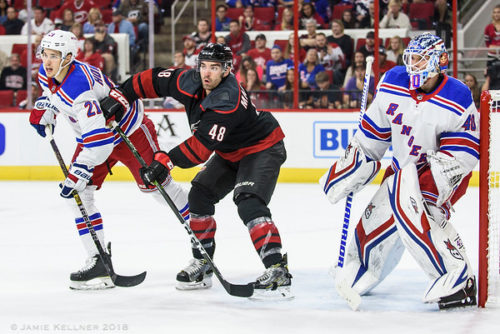In less than three seasons in a Carolina Hurricanes jersey, Kevin Weekes collected a modest 39 wins in 119 games in net for the Canes. But like many Hurricanes heroes, his place in team history was claimed by the magnitude of a few contributions not the sheer volume of them.
Kevin Weekes was obtained by the Carolina Hurricanes in the midst of a flurry of Jim Rutherford maneuvers in the second half of the 2001-02 season. Rutherford reacquired Sean Hill in December filled out his top 4 defense in a shakeup trade that added Kevyn Adams and Bret Hedican in return for a struggling Sandish Ozolinsh. The trade that sent Chris Dingman and Shane Willis to Tampa to add Kevin Weekes as a backup looked like a very ho-hum finale for a busy season of Rutherford dealings. Arturs Irbe was playing well and was the horse that the Canes were going to ride in seeking a second consecutive playoff berth.
And during the rest of the regular season, that is what happened. With the Canes riding Irbe, Kevin Weekes saw action in only two of the Canes 17 regular season games after he was acquired. He spelled Irbe once on March 21, 2002 in a 3-2 win and then subbed again on April 12, 2002 to give Irbe a rest before the playoffs after the Canes had wrapped up the division title.
When the playoffs started, plan A, B and likely C were all likely the exact same – ride workhorse Arturs Irbe to wherever it led. And that plan started very positively. By virtue of winning the Southeast Division (despite finishing seventh in the Eastern Conference in points), the Canes had home ice advance and capitalized on it jumping out to a quick 2-0 series lead with back-to-back wins in Raleigh. Optimism for Caniacs rocketed to an all-time high. But things took a swift and dramatic turn for the worse when the series returned to New Jersey. In game three, the dominant, stifling and playoff-savvy Devils bounced back. Only 58 seconds into the second period, the Devils scored their third goal and chased Arturs Irbe from the game eventually cruising to a 4-0 win. Cruising was only on the scoreboard. The process was actually worse. The Devils returned to their stifling, offense-destroying ways and just completely dominated the game. The Canes were behind early and mostly finished with that third New Jersey tally only 21 minutes into the game. Maybe more disconcerting was the emergence of an even more intense level of the same playoff dominance that the Canes were subject to in their 2001 first-round loss to the same Devils. Even when the Canes were down and needed to put the foot on the gas offensively, they mustered virtually nothing. The Canes put up a meager 17 shots in the affair and a scoring chance tally that could have been counted on one hand. But the Canes exited game three still with a 2-1 lead in the series and still with home ice advantage.
Even with the blow to confidence delivered in game two, Canes fans could easily enter the game with optimism given the 2-1 lead and two of the four remaining games still at home. As expected, game three in New Jersey saw a return of Arturs Irbe in net. But that optimism was sucked out of the Canes faithful almost immediately upon drop of the puck. Bobby Holik scored only 1:16 into the first period. The Devils followed up with another goal in the first and again sent Arturs Irbe to be a spectator for the last two-thirds of the game. In this hockey era and against this team, a 2-0 deficit seemed insurmountable, and in game four of the first round of the 2002 playoffs against New Jersey, it was. The Canes went on to lose 3-1 scoring only a lone inconsequential goal with about three minutes remaining and after the outcome had been decided. A tiny bright spot down the stretch was the Canes did not see a complete collapse. I still remember my feeling after the first period and thinking how much this game seemed set up for a Canes capitulation that saw the Devils pile on, step on the Canes jugular vein and try to end the series despite the fact that it would be split 2-2 after four games. Despite the fact that he had played only eight periods of hockey over the previous two months, Weekes actually looked pretty good down the stretch holding the Devils to only one goal on 14 shots.
One cannot appreciate what happened next and Kevin Weekes’ place in Carolina Hurricanes history without and understanding of the path traveled to get here. With the first couple years of Hurricanes games being played in Greensboro while the Raleigh Entertainment and Sports Arena (ESA) was being built, the Canes finally arrived “home” in Raleigh for the 1999-00 season. One season later, the Canes squeaked into the playoffs in the 8th and final playoff spot in the Eastern Conference therefore serving up Raleigh’s first taste of playoff hockey in the spring of 2001. The Canes drew arguably the best team in the league at the time. Led by a collection of perennial all-stars (and future hall-of-famers), the Devils were the reigning Stanley Cup Champions, had the record in the Eastern Conference and boasted an impressive #1 ranking in scoring and #5 ranking in fewest goals against. Experts unanimously (nearly literally) picked the Devils to trounce the Canes and then quickly moved on to watching first-round playoff series with potential drama. And early on, the quick dismissal of the Canes looked accurate. In games one and two, the Devils quickly and violently delivered a memo declaring a short series. New Jersey drubbed the Hurricanes 5-1 and 2-0 on the scoreboard in the first two games on the 2001 first-round playoff series. Equally significantly, they physically bullied and beat the Canes behind a big, physical and nasty blue line. Kevin Stevens delivered the signature blow with a huge hit on concussion-causing hit on Shane Willis in game two. By the time playoff hockey even arrived in Raleigh, the series seemed to be over. I remember being so excited to take in home playoff hockey in Raleigh but also feeling like there was a bit of a dark cloud hanging over it given the status of the series and the results in the first two games. Optimism for series victory was difficult to muster. Regardless of broader series implications, the optimistic hope was that game three would at least offer a taste of everything so wonderful that I had heard about playoff hockey. It offered exactly none of it. Early in the first period, Canes captain Ron Francis was felled by another crushing Scott Stevens hit that left Francis concussed and Canes fans with a lasting memory of a confused and wobbly Francis struggling unsuccessfully to make it to the bench. The route was on again with the Devils streaking to a lopsided 4-0 win. The game then featured an “everyone on the ice” fight sometime after the Francis hit. The response was appreciated in the sense that the team stood up for its captain, but no Canes really exacted revenge (somehow Sandis Ozolinsh was the one paired with Stevens), and the melee had more of a “had to be done” kind of feel than a true victory of any kind. I will save the even longer story for another time, but an undermanned Canes team responded to win game four at home and also game five in New Jersey before ultimately losing the series in game six at home. I believe what happened in those three games was the biggest contributor in building the special relationship between the team and its fans, but again, that story is for another time. When it was all said and done, the Canes rebound did give newly minted Canes fans at least a taste of NHL playoff goodness that seemed out of reach after the first three games. But even with the rebound, the Devils clearly had the upper hand over the Canes and were not a team that anyone was happy to see on the playoff slate first again in 2002.
So fast forwarding back to the spring of 2002, the point is that despite being tied 2-2 after four games with New Jersey in the first round of the 2002 playoffs, it was hard to muster a “three game series with home ice advantage” positive attitude. The dominant and stifling wins by New Jersey in games three and four brought back fresh memories of a Devils team that manhandled the Canes the previous year. The experts were pointing to the Devils rebound and dominance in games three and four and assuming (vocally) that the Devils would ride the momentum to a comfortable six-game series win. And if you projected the series outcome based on the trend entering game five, I am not sure how you would come up with any other conclusion. The Canes had been beaten decisively in games three and four, and starting goalie Arturs Irbe had looked vulnerable and been chased in both of them.
Nothing was said by Coach Paul Maurice or anyone else about the starting netminder for game five back in Raleigh. There was some chatter about Maurice possibly turning to Weekes after he gained four periods of ice time to shake off any rust and looked decent in relief in game four. But I think the odds were still that Maurice would hope home ice offered a fresh start and go back to the workhorse Irbe. I still remember watching from my upper level seats across the arena when Kevin Weekes led the team onto the ice as the starter and thinking that one way or another Canes fans were in for an eventful night.
Early on, I watched from the edge of my seat with an “I have NO idea how this all ends” mentality and my first extreme case of playoff hockey stress and excitement. The Devils came out with a strong push to pick up right where they left off in game four. They were aggressive early and got the better of play early while the Canes tried to get their skates under them and find their way back into a series that had swung significantly since the first two games in Raleigh. Kevin Weekes was the answer early. At the end of the first period, the shots were 14 to 7 in favor of New Jersey who was clearly the better team, but the scoreboard showed 0-0 thanks in large part to Weekes’ play. Had Weekes been shaky early to tune of two or maybe even just one Devils’ goal, one would have to think that the Canes would never have gained their footing and that the series would have been destined for a four-game run by New Jersey to win it in six games. Instead, Weekes continued to play strong and at least give the Canes a chance to win or even steal a game. The Canes were down 1-0 in the second period and 2-1 for much of the third period but stayed close enough that perhaps a lucky or heroic play or two could steal a win. With timing running out, Jeff O’Neill notched the first heroic play to tie the score at 2-2 with only 1:29 left in the game and setting up an overtime thriller.
The Devils had the best chance early in overtime only to be robbed by Kevin Weekes. The first save turned out to be only the appetizer for what to this day I think is the greatest save in Carolina Hurricanes history. About five minutes into overtime a breakdown found the Devils wide open with the puck and time right in front of Weekes and the Canes net. Weekes first made a desperation save lunging to his left. Unfortunately, the puck then found the stick of John Madden on the other side of a sprawled out Kevin Weekes and looking at half of an open net. To this day and after watching replay hundreds of times, I still have no idea how Weekes managed to go from down and out the one way to being upright with the puck in his glove the other way. The play is pure desperation. The save to the left was nothing more than an athletic dive to the puck. Then to go from there to upright and in the play at all for the second shot still seems like an impossibility. And then to top it off, he somehow backhand gloves the second shot. The second shot was blocker side on Weekes whose glove was on his left hand. That save was followed minutes later by a Josef Vasicek overtime-winner that sent the then ESA (Entertainment and Sports Arena) into bedlam. Kevin Weekes was then perfect in registering a 1-0 shutout in a tight game six in New Jersey to close out the series and deliver the team’s first playoff series win.
In the 2002 playoffs, Weekes ran his streak to three wins in winning the first game of the next series versus Montreal before losing two games and ultimately handing the reins back to Arturs Irbe. Somewhere along the way, he also became known affectionately as “Shady 80” (he wore #80). He was also the team’s primary started for the 2002-03 and 2003-04 seasons notching 37 wins in those seasons. But ultimately he carved out a significant place in Carolina Hurricanes history in a very short period of time in April of 2002.
At the point when Kevin Weekes and the Carolina Hurricanes defeated the evil, hated and elite New Jersey Devils, the 2002 playoffs were a huge success for the team and its emerging fan base. Weekes’ volume of wins in those 2002 playoffs was modest at three, but the volume of unforgettable memories that he made possible were many more. Without his unlikely heroics in game five and game six against New Jersey, Canes fans would not have witnessed the Miracle at Molson, the Jeff O’Neill black eye game, Ron Francis’ overtime-winner in the Finals versus Detroit, the triple overtime thriller versus Detroit or two more series wins. It is impossible to say exactly how the Hurricanes history would be different if not for Weekes’ highway robbery on John Madden and the game win, series win and playoff run that followed. But when you look at how mightily the Canes struggled the next two seasons and the full season lockout that followed that, maybe it is not out of the question to say that with one save and one win Kevin Weekes saved the future of NHL hockey in Raleigh.
Kevin Weekes’ contributions to Carolina Hurricanes history were not based on longevity or volume of stats. Instead they were rooted in a short burst of heroics, arguably the most significant in the team’s history, and the drama and flare with which they were accomplished.



